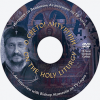The 20-minute work “makes a huge emotional journey in a relatively short period of time, moving through many landscapes between the mysterious, moody opening and the ecstatic conclusion,” said award director Marc Satterwhite.
.“The composer also makes wonderful use of the colors of the 14-piece ensemble. The instruments are used in fascinating ways, both traditional and otherwise … that shape the sound of unnatural, echoing beauty,” he said.
Zivkovic, 38, describes the piece as an “instrumental cantata” inspired by the religious music of Bach. Its main theme is the need to return to oneself.
“It is about hard-achieved detachment, stillness and watchfulness, it’s about solitude and exile,” the composer said.
Born in Belgrade in 1975, Zivkovic has lived in Stockholm, Sweden, since 2000. He is active as a violinist and violist—with a special interest in improvisation—and teaches at the Royal College of Music in Stockholm.
Austrian ensemble Klangforum Wien gave the first performance of “On the Guarding of the Heart” in November 2011 in Belgrade. The piece also has been performed in Vienna and Bergen.
Zivkovic’s music has been commissioned, performed, recorded and broadcast across Europe and North America by ensembles such as Sonanza, Klangforum Wien, Trio Fibonacci, Musica Vitae Chamber Orchestra, BIT20 and Stockholm Symphonic Wind Orchestra and people such as conductors Emilio Pomarico and Baldur Brönnimann and Swedish contralto Anna Larsson.
He received a Swedish Grammy Award 2010 (Grammis) with Sonanza for his piece “Le Cimetière Marin” for mezzo-soprano and ensemble.
Influenced at an early age by folklore and Byzantine music, he has developed a wide range of composing techniques such as polyrhythms, improvisation, harmony-based scales and microtones. Over the past decade, he has become particularly interested in harmonic organization, an area he has identified as crucial in modern compositions.
UofL presents four Grawemeyer Awards each year for outstanding works in music composition, world order, psychology and education. The university and Louisville Presbyterian Theological Seminary jointly give a fifth award in religion. This year’s awards are $100,000 each.
For more details on the awards or to download Zivkovic’s photo, see grawemeyer.org






